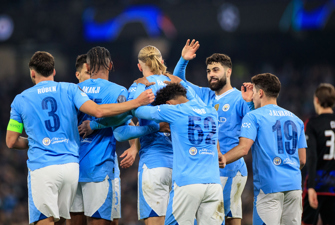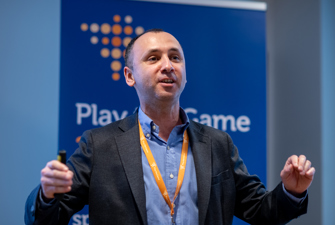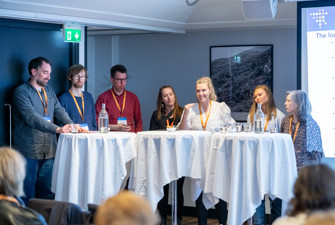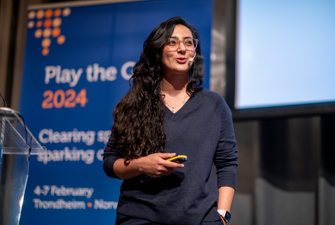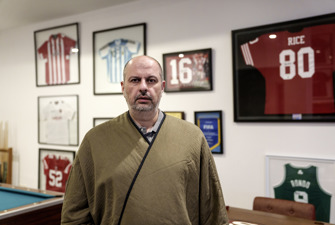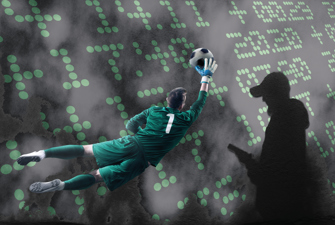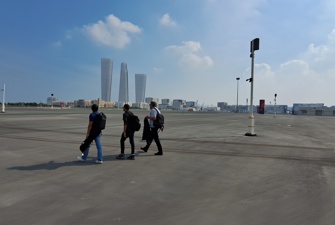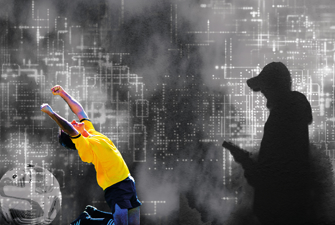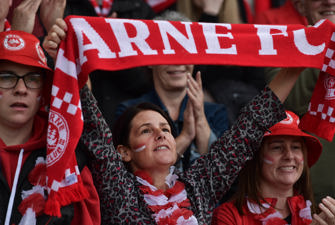Time to look beyond organised crime to stop match-fixing
ANALYSIS: Organised crime is not the only driver behind match-fixing. Financial instability and unequal distribution of revenue in European football are other factors, explains Steve Menary and calls on sport authorities to help find solutions.
An obvious consequence of the lockdown should have been that less sport equals less match-fixing. Yet, this year looks likely to set a record for alerts over suspicious matches, particularly in European football.
At the International Betting Integrity Association (IBIA), 32 alerts were escalated on European matches in 2019. By the third quarter of 2020, 25 match alerts have already been issued. As the sport emerged from corona lockdown, plenty of others have attracted suspicion from Armenia to Cyprus, the Czech Republic, Russia, the Ukraine and Turkey.This summer, Europol warned of increased involvement from organised crime in match-fixing, but this increasingly accepted narrative is a simplistic explanation that absolves sport itself for any responsibility.
Khalid Ali, IBIA’s chief executive officer, says:“Organised criminal activity is clearly involved in betting related match-fixing and is a major threat, but it’s not the only threat. We’ve seen from a range of sports that match-fixing can be triggered by players in the lower levels betting on their own matches to subsidise the lack of income from their sporting activities.”
Sporting reasons is a key driver for match-fixing
The notion of the mob fixing games gains more traction in the media than a club owner in some impoverished eastern European country trading points for a better league position. However, sporting reasons have long been a key driver for manipulating matches and this has not changed.
In 2011, a report called ‘The Prevalence of Corruption’ by the European Sports Security Association (now the International Betting Integrity Association) and Coventry University found that 42% of match-fixing cases identified in sport were for sporting reasons. And 83% of overall cases were in Europe, mainly within football.
The point is further underlined in the ‘Typology Framework of sports manipulations’ that was published this summer by the Council of Europe Network of National Platforms – also known as the Copenhagen Group. The first two categories refer directly to types of match-fixing undertaken for sporting reasons:
- Exploitation of governance – for example, the owners of two sports clubs agree the outcome of a sports competition and instruct their teams to ensure that outcome is achieved.
- Exploitation of power/influence – for example, a sponsor of a club promises a new sponsorship contract to a player of a rival club if they ‘help’ their team to lose their next game.
Organised crime certainly plays an increasing role in match-fixing and should never be discounted but the underlying reasons for increasing manipulation, particularly at a lower level in European football, are far more complex.Andy Harvey, a lecturer in sports science and exercise at Swansea University, who worked for players union FIFPro on its research on match-fixing, says:
“There are two narratives on match-fixing. The first was that the players were at fault. FIFPro did a lot of work around this and yes, players are involved but there are a lot of other actors. It’s coaches, directors, agents and a host of others involving outside companies.”
“Then there are the other issues like gambling and non-gambling related match-fixing. This all connects to good governance.”
Lower leagues in Europe lack income
Attempts to improve governance in football are increasingly undermined by financial instability and the unequal distribution of revenue in European football.Aggregate revenue at UEFA from the Champions League, Europa League and Super Cup in 2019/20 is expected to be around €3.25 billions. Of this total, €10 millions were set aside to subsidise solidarity payments to clubs eliminated in the qualifying rounds of the Champions and Europa Leagues.
“We have always argued for fairer distribution of revenue,” says Tony Higgins from international footballer’s union, FIFPro.
“The pandemic has exposed the lack of resources amongst the smaller federations and leagues.”
Simply surviving is a challenge in many of UEFA’s smaller members. In Lithuania for example, 20 clubs vanished in the decade up to June 2015 and this is not a problem restricted to the Baltic. In Eastern Europe, some clubs survive in name, going bust then being resurrected in a new form under a version of the old name.
Starting up a club is not expensive. Grounds are often rented and some clubs play in daylight to avoid paying for floodlights. The main expense is wages for players. The problem is income.
If domestic fans prefer to watch the English Premier League or Spain’s La Liga on television to watching their own domestic football, income from ticket sales, TV rights and sponsorship becomes hard to find.
UEFA revenue is very important in many leagues
UEFA’s latest club licensing benchmarking report, which covers the 2018 financial year, illustrates the growing gap between rich and poor.
In 2018, net profits rose to record levels at clubs in the leading 20 leagues. In the remaining 35 UEFA members, only eight competitions made an aggregate profit. Four of those countries – Croatia, Iceland, Moldova and Ukraine – were reliant on money from transfers to stay profitable. With the exception of Iceland, match-fixing has been a constant issue in the remaining trio.
TV income is virtually negligible for the 15 smallest leagues in UEFA, and in an era of spiralling wage inflation losses at clubs in smaller leagues are rising. Amongst the smaller leagues where profitability remains elusive, the number of countries reporting net loss margins of more than 20% has increased from 11 to 13.In the Czech Republic, Georgia, Gibraltar, Israel, Kosovo, Latvia and North Macedonia, the margin of losses was more than 30%. And nearly 400 clubs outside the top 20 league had a loss margin of 11% - and this was before the virus.
In its benchmarking report, UEFA notes:“Revenue from UEFA club competitions is very important for clubs in most middle and lower-income leagues. In 16 of the bottom 35 countries, UEFA payments accounted for a third or more of all revenue.”
The importance of UEFA money was illustrated this summer, when an attempt to manipulate the Andorran Cup final was reportedly based on a wish to gain access to European competition.
Ownership of football clubs is another issue
For clubs not playing in Europe, benefactors are increasingly essential, particularly in Eastern Europe, where many federations have been trying to ease clubs out of public ownership. This was a holdover from Soviet times, when state control was omnipotent. The Eastern bloc has gone but many councils or state bodies still find themselves subsidising professional football cubs in partnership with private owners, whose suitability rarely comes under the microscope.
The UK’s Fit and Proper Persons Test for owners of football clubs has been criticised – sometimes rightly – but in many European countries, no such test exists. And in most of these countries, match-fixing is a problem.“Ultimately, it’s about how clubs are owned and run and pretty much anyone can become an owner of a football club,” says Andy Harvey.With the financial impact of the lockdown reverberating throughout European football, income from sponsorship is likely to further diminish. Fixing a game to subsidise the running of a club is an increasing temptation.
In the Copenhagen Group’s typology, ‘direct interference in the natural course of a sporting event or competition instigated by exploitation of governance’ is the primary type of manipulation.
Lack of governance for friendly matches
This year has seen a surge in concern over friendly matches in European football, mainly played by lower league clubs, with more than 80 games attracting suspicion so far in 2020. This is because virtually no governance exists for friendlies.These games invariably find their way onto the Asian markets, where demand for betting on European football – even clubs few in Europe might have heard of – is burgeoning, in part because many bettors in Asia do not want to place wages on their own often corrupt leagues.
On the amorphous Asian markets, a fix aimed at generating €30,000 to €40,000 for a club owner that is either unscrupulous or desperate barely registers. These clubs are not all in the grip of organised crime. Some owners are criminals, some are opportunists and some are morally flexible owners trying to keep their club afloat.The financial pressures faced by clubs outside the elite are growing. Even more so in the second and third tier leagues where clubs are stuck in a kind of limbo, chasing a place amongst their national elite but often unable to afford wages as sponsorship, transfer fees and TV rights all flow remorselessly towards the bigger leagues and clubs.
Time for a new narrative on match-fixing
How match-fixing is framed needs to change argues Marcelo Moriconi, researcher and guest assistant professor at Portugal’s Centro de Estudos Internacionais. He explains:
“The official preventative narrative was used in a successful way to create a narrative that put the responsibility outside the sports world. So, you transform something that is historically part of football like match-fixing and you transform yourself into an integrity warrior.”Match-fixing has always existed in football and pinning all the blame on organised crime lets sports authorities off the hook when it comes to finding a solution. Wider structural changes in how football is funded, particularly outside elite leagues, are needed to stem the tide of fixing that is undermining the credibility of European football on the increasingly forgotten fringes.
Betting companies and data companies could be openly discouraged from offering many of these games but the integrity of these leagues can – and should have – been bolstered by UEFA. FIFPro’s Tony Higgins says:“With the pandemic and the lack of resources, you don’t expect there to be much progress but this should have been done before.”
Last year, UEFA president Aleksander Ceferin conceded that sport could not deal with match-fixing alone and commissioned a feasibility study into the idea of creating a pan-continental integrity body.
Work is due for completion by the end of this year. With football across Europe creaking under the weight of escalating financial pressure and the temptation to fix games only growing, there has never been a more urgent time to address the problems of governance and inequality in European football that are at the root of the fixing.












